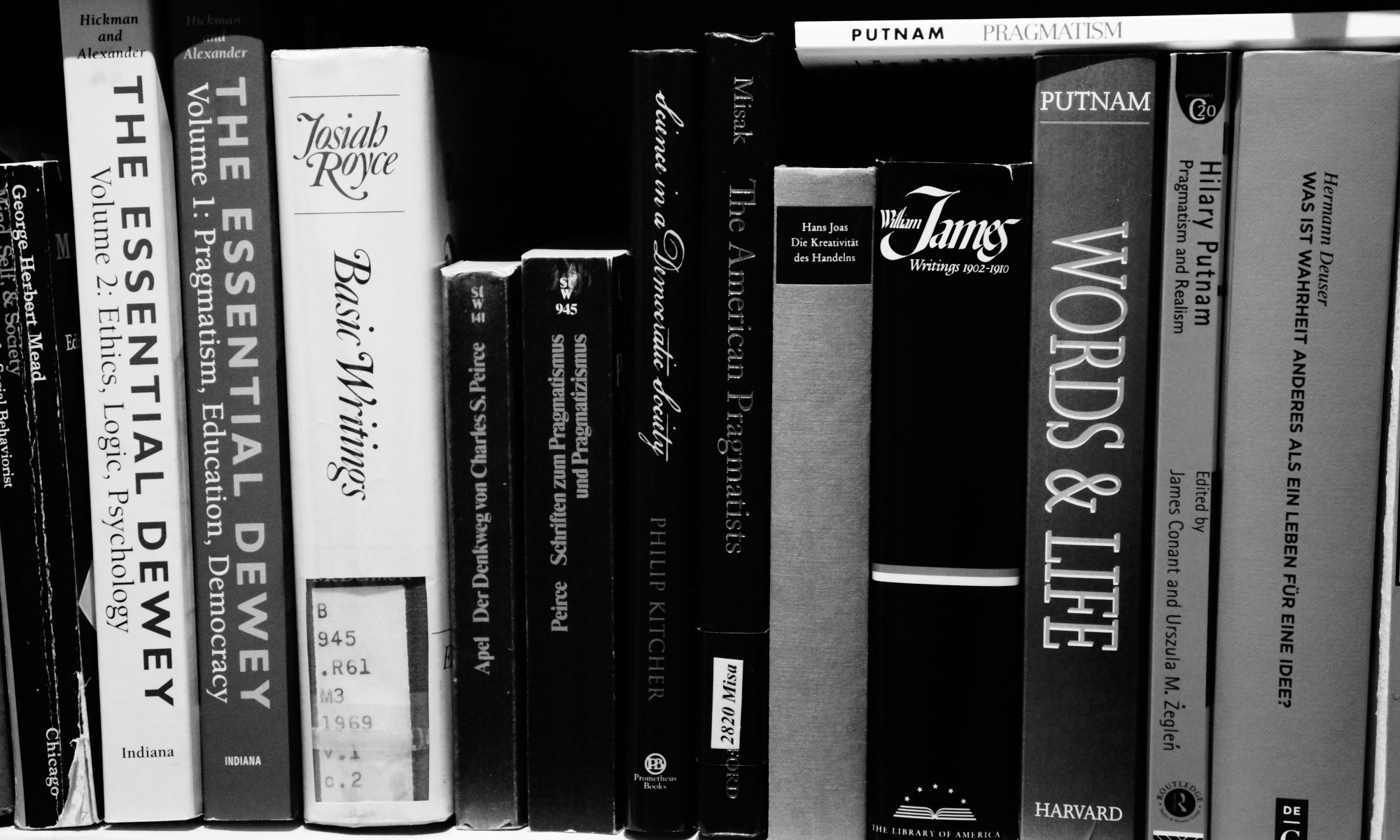Strohmaier, A. (2019). Poetischer Pragmatismus: Goethe und William James. Berlin: De Gruyter.
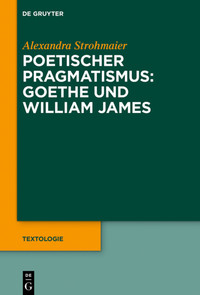 | Die Studie stellt eine Pionierarbeit dar: Sie zeigt erstmals die historischen und systematischen Beziehungen zwischen den Werken Goethes und William James‘ auf. Dabei wird zum einen die Goethe-Lektüre des US-amerikanischen Philosophen in ihrer Bedeutung für die Genese und Poetizität des James’schen Pragmatismus rekonstruiert. Zum anderen wird die (proto-)pragmatische Dimension von Goethes Werk herausgearbeitet und dieser als literarischer Philosoph und Wegbereiter des angloamerikanischen Pragmatismus exponiert. Mit der Konturierung der vielfältigen diskursiven Relationen zwischen literarischen, philosophischen und naturwissenschaftlichen Wissensordnungen der Goethezeit und jenen der US-amerikanischen Kultur des späten 19. und beginnenden 20. Jahrhunderts gewinnt der Pragmatismus als transatlantische Denkbewegung Profil. Auf theoretisch-methodischer Ebene leistet die Studie einen wesentlichen Beitrag zum interdisziplinären Forschungsfeld „Literatur und Philosophie“, wobei neben der Rolle literarisch verfasster Philosopheme insbesondere auch das epistemische Potential literarischer Verfahren und deren spezifische Funktionen für die Konstitution philosophischer Diskurse und Praktiken demonstriert werden. |
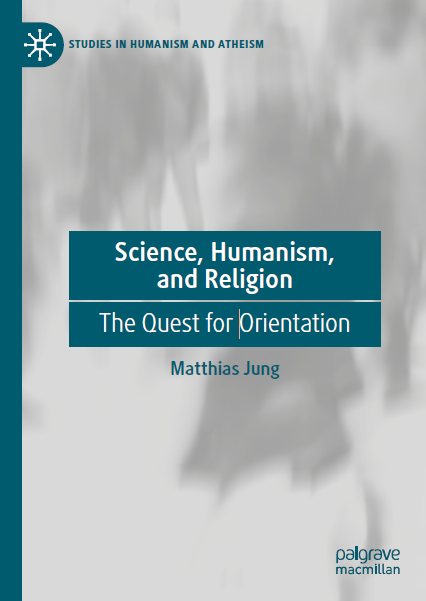 | In the human quest for orientation vis-à-vis personal life and comprehensive reality the worldviews of religionists and humanists offer different answers, and science also plays a crucial role. Yet it is the ordinary, embodied experience of meaningful engagement with reality in which all these cultural activities are rooted. Human beings have to relate themselves to the entirety of their lives to achieve orientation. This relation involves a non-methodical, meaningful experience that exhibits the crucial features for understanding worldviews: it comprises cognition, volition, and emotion, is embodied, action-oriented, and expressive. From this starting-point, religious and secular worldviews articulate what is experienced as ultimately meaningful. Yet the plurality and one-sidedness of these life stances necessitates critical engagement for which philosophy provides indispensable means. In the end, some worldviews can be ruled out, but we are still left with a plurality of genuine options for orientation. |
Frega, R. (2019). Pragmatism and the Wide View of Democracy. Basingstoke: Palgrave MacMillan.
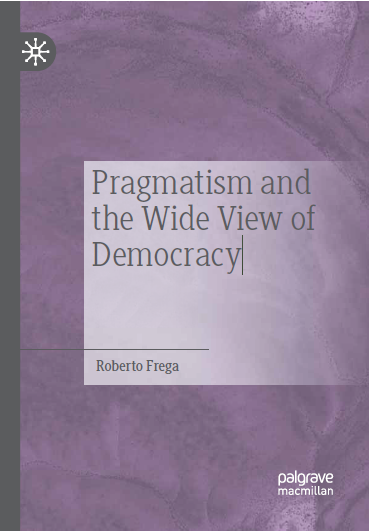 | The aim of this book is to provide a fresh, wider, and more compelling account of democracy than the one we usually find in conventional contemporary political theory. Telling the story of democracy as a broad societal project rather than as merely a political regime, Frega delivers an account more in tune with our everyday experience and ordinary intuitions, bringing back into political theory the notion that democracy denotes first and foremost a form of society, and only secondarily a specific political regime. |
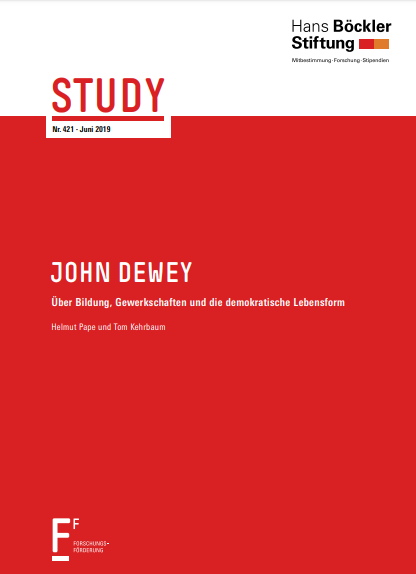 | John Dewey war mehr als ein Philosoph, Pädagoge und Psychologe: Als Publizist, Gewerkschafter und Politiker kämpfte er für seine Vorschläge. Die Publikation zeigt an zwei historischen Fällen und anhand seiner theoretischen Arbeiten, wie sich Dewey für eine partizipative gewerkschaftliche und berufliche Bildung einsetzte. Das Buch ist als Open-Access-Publikation durch Klicken auf die Überschrift erhältlich. |
Articles
Bleyer, B. (2019): Pragmatische Urteile in der unmittelbaren Patientenversorgung. Moraltheorie an den Anfängen Klinischer Ethikberatung. (Gesundheit und Medizin im interdisziplinären Diskurs, 2) Berlin, https://doi.org/10.1007/978-3-662-58672-3
Briese, J. (2019): Intentionalität ohne Intentionalismus? Entwurf eines sprachgebrauchs- und zeichenbasierten Konzepts von Denk- und Handlungsfähigkeit. In: Simon Meier/Lars Bülow/Frank Liedtke/Konstanze Marx/Robert Mroczynski (Hrsg.): 50 Jahre Speech Acts. Bilanz und Perspektiven. Tübingen: Narr Francke Attempto. S. 203-226.
Feldmann, K. (2019). Peirces pragmatischer Handlungsbegriff als Grundlage eines philosophiedidaktischen Konzepts des handelnden Lernens. In: Thein, C. (Ed.), Bildungsphilosophie und Philosophiedidaktik (working title), Wiesbaden: Springer.
Jörke, D. (2019). John Dewey. In: Comtesse, D. u.a. (Hg.): Handbuch Radikale Demokratietheorie, Berlin: Suhrkamp.
Henning, C. (2019). Materialität und Werterfahrungen in der kreativen Arbeit: Pragmatistische Interpretationen. In: Henning, C. & Thomä, D. & Schultheis, F. (eds.): Kreativität als Beruf: Soziologisch-Philosophische Erkundungen in der Welt der Künste, Bielefeld: Transcript, 143-196.
Kramm, M. (2019): Capability and Habit, Journal of Global Ethics, 15 (2).
Müller, M. (2019): Richard Rorty und das kommunitarische Denken. In: Reese-Schäfer W. (eds.) Handbuch Kommunitarismus. Wiesbaden: Springer VS.
Nungesser, F. (2019): George Herbert Mead und die Kultursoziologie. In: Moebius, S. & Nungesser, F. & Scherke, K. (eds.): Handbuch Kultursoziologie. Band 1: Begriffe – Kontexte – Perspektiven – Autor_innen. Wiesbaden: Springer, 577-590.
Polke, C. (2019): Vom Glauben und Wissen im Handeln. Jacobis proto-pragmatistische Ethik. In: Schreiber, G. (Ed.), Interesse am Anderen. Interdisziplinäre Beiträge zum Verhältnis von Religion und Rationalität (FS H. Schulz), Berlin/Boston: de Gruyter, 665-687.
Räber, M. (2019): Political Representation from a Pragmatist Perspective: Aesthetic Democratic Representation, Contemporary Pragmatism, 16 (1), 84-103.
Reder, M. (2019): The (Global) Sphere of the Political. Critical Views on Habermas’ and Rorty’s Concepts of Religion and Human Rights. In: Roeber, A.G. (Ed.): Religious Rights, Civil Rights, Human Rights in the German and American Contexts. Penn State: Penn State University Press.
Viola, T. (2019). Articulate Reason and Its Elusive Background. Notes on Royce’s Late Reading of Peirce. In: Schlette, M. et al. (eds.): Idealbildung, Sakralisierung und Religion. Im Gespräch mit Hans Joas. Frankfurt: Campus.
Weydner-Volkmann, S. (2019). Ethische Technikfolgenabschätzung als Kartografie situativer Wertungskonflikte. Moralpragmatische Perspektiven zum Neutralitätsproblem, TATuP Zeitschrift für Technikfolgenabschätzung in Theorie und Praxis 28 (1), 39–44. https://doi.org/10.14512/tatup.28.1.39.
